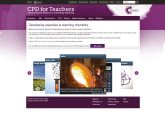I’ve stood in front of countless teachers, heads and advisors and used a C word that will divide almost every audience. For some, I will be talking about something dear to their heart and offering support for challenges they face daily. For others, I’ve lost them before I’ve even begun. Careers Education, Careers Information, Careers Advice or Careers Guidance; in any iteration, the prefix of ‘careers’ can conjure up images of a dusty old library where as students ourselves we may have been given advice we didn’t think was beneficial. In all too many instances, it has become a tick-box exercise that someone else deals with. Regardless of the reaction to this word however, almost everyone I meet has one thing in common – a passion to help learners to progress and fulfill their potential. So why the negativity?
A whole school journey
Imagine we were discussing mathematics. If you were presented with a school where instead of timetabled lessons, the staff provided one-to-one maths support towards the end of a student’s school journey, supplemented by non specialist teachers providing input during tutor periods and various trips happening elsewhere but not joined together in terms of strategy or learner outcomes, you would no doubt label that ineffective. Yet for too long, this model has been the reputation that ‘careers’ has struggled to shake off. They are quite different agendas and careers guidance may never enjoy the resource and staff of a mathematics department, but the most successful schools take inspiration from the rigour they apply to curriculum delivery and use a similar approach to the progression of their learners to a positive destination.
Conscious of the snoozing audience members, then, I’ll quickly change tack and start to explain what careers guidance looks like done well. I’ve worked with schools where every member of staff is either aware of or directly involved in the delivery of a skills or careers programme. These programmes begin with Year 6 to 7 transition and support continues through to Year 11 or 13 leavers. Students across the school are engaged, motivated and ambitious. Engagement starts early with a Year 7 student identifying his personal skills and consciously selecting extra curricular activities to help him to develop. It may then progress to the entrepreneurial Year 10 who has used a work experience placement to set up her own product review business using YouTube videos. Whatever the individual journey to this point, the programme concludes with successful progression post 16 and 18 into sustained participation. The one to one guidance interview that some may imagine is where careers guidance starts and ends, is just one element of an intentional and personalised learner journey.
In a recent project undertaken by U-Explore we spent at least a day with over 60 secondary schools, and it became clear that the one stand out theme of a great delivery model was involving the whole school.
Every level
As a business studies teacher, the role of subject teachers in careers guidance is something I am personally passionate about. In our department we had resources coming out of our ears on topics such as CV and formal letter writing, researching and understanding the world of work, conducting yourself in an interview and being entrepreneurial. These were however reserved for the sole use of the students on our course. Meanwhile someone in the tutor team was busy duplicating this work whilst juggling being a biology teacher. Teachers across all subject areas can both contribute to and benefit from an integrated approach, but it also needs a dedicated pair of eyes to spot the opportunities and support this activity. One starting point is to set up a cross curricular group, much like you may already have for literacy, to meet regularly and develop ideas.
For a school to succeed with an effective delivery model for progression, it needs to be encouraged and facilitated by the SLT and Governing Body. The first and most important step is making the agenda a high priority. Indeed, Ofsted has previously cited that the most successful schools have leaders which are ‘forward thinking’ and ‘make careers guidance part of their strategic efforts to foster better achievement and well-being for all their students’.
Achieving this will probably start by redefining what careers guidance actually means and ensuring that ‘careers’ – or any other word or phrase your school choose to adopt – becomes the architecture for learners to make all of their choices, from education to job and everything in between. You may then find yourself in a position where the programme securing the future of your learners comes out of hiding and into full view of the talented team who will make it excel.
About the author
Danielle Wood worked as a business studies teacher prior to joining U-Explore in 2009 and has been instrumental in the expansion of its services for schools, including providing advice for educators looking to develop their careers strategy. For more information contact danielle.wood@u-explore.com










